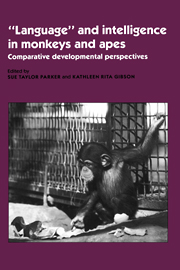Book contents
- Frontmatter
- Contents
- List of contributors
- Foreword
- Preface
- Acknowledgments
- Part I Theoretical frameworks for comparative developmental studies
- 1 Origins of comparative developmental evolutionary studies of primate mental abilities
- 2 How scientific usages reflect implicit theories: Adaptation, development, instinct, learning, cognition, and intelligence
- 3 New perspectives on instincts and intelligence: Brain size and the emergence of hierarchical mental constructional skills
- 4 Why big brains are so rare: Energy costs of intelligence and brain size in anthropoid primates
- Part II Comparative developmental perspectives on cebus intelligence
- Part III Questions regarding imitation, “language,” and cultural transmission in apes and monkeys
- Part IV Developmental perspectives on social intelligence and communication in great apes
- Part V Development of numerical and classificatory abilities in chimpanzees and other vertebrates
- Part VI Comparative developmental perspectives on ape “language”
- Index
3 - New perspectives on instincts and intelligence: Brain size and the emergence of hierarchical mental constructional skills
Published online by Cambridge University Press: 11 May 2010
- Frontmatter
- Contents
- List of contributors
- Foreword
- Preface
- Acknowledgments
- Part I Theoretical frameworks for comparative developmental studies
- 1 Origins of comparative developmental evolutionary studies of primate mental abilities
- 2 How scientific usages reflect implicit theories: Adaptation, development, instinct, learning, cognition, and intelligence
- 3 New perspectives on instincts and intelligence: Brain size and the emergence of hierarchical mental constructional skills
- 4 Why big brains are so rare: Energy costs of intelligence and brain size in anthropoid primates
- Part II Comparative developmental perspectives on cebus intelligence
- Part III Questions regarding imitation, “language,” and cultural transmission in apes and monkeys
- Part IV Developmental perspectives on social intelligence and communication in great apes
- Part V Development of numerical and classificatory abilities in chimpanzees and other vertebrates
- Part VI Comparative developmental perspectives on ape “language”
- Index
Summary
Two great religious traditions, Christian and Hindu, provide sharply dichotomous views of humanity. For the Christian, unbridgeable spiritual gaps separate humans from animals. Humans have souls; animals do not. For the Hindu, animal and human minds represent different points on a continuous progression toward Nirvana. These two philosophical perspectives permeate scientific as well as religious concepts of the human mind.
Twenty-five years ago, the dominant anthropological and psychological paradigms followed the Christian tradition in considering humans and animals to be separated by qualitative, seemingly unbridgeable, behavioral gaps: Humans were the only animals who could symbolize, make a tool, or recognize their own self-images. Within that theoretical climate, Ralph Holloway proposed his now classic theory of the evolution of the human brain. Brain size alone cannot account for the behavioral distinctions of the human species. Rather, the human brain has been reorganized, thereby permitting language and other mental skills (Holloway, 1966, 1968). Holloway's theory met with wide acclaim. It seemed intuitively correct.
Nearly simultaneously, Harry Jerison set forth a quite different theory, more in keeping with the Eastern tradition of a continuum between animal and human minds: Human intelligence reflects changes in brain size and in total information-processing capacity (Jerison, 1973). Unlike Holloway, Jerison received a cool reception. Those who considered human behavior qualitatively distinct from that of the apes also expected qualitative, rather than quantitative, differences in brain structure.
In the intervening years, our knowledge of primate behavior has expanded.
Information
- Type
- Chapter
- Information
- 'Language' and Intelligence in Monkeys and ApesComparative Developmental Perspectives, pp. 97 - 128Publisher: Cambridge University PressPrint publication year: 1990
Accessibility standard: Unknown
Why this information is here
This section outlines the accessibility features of this content - including support for screen readers, full keyboard navigation and high-contrast display options. This may not be relevant for you.Accessibility Information
- 72
- Cited by
